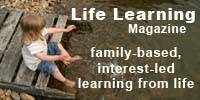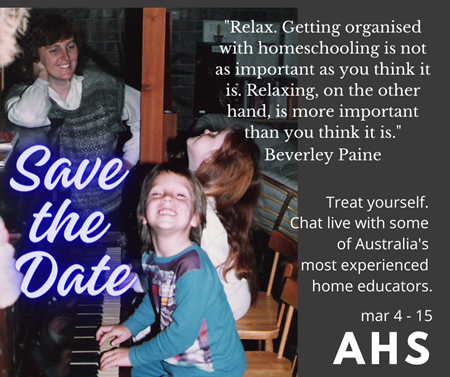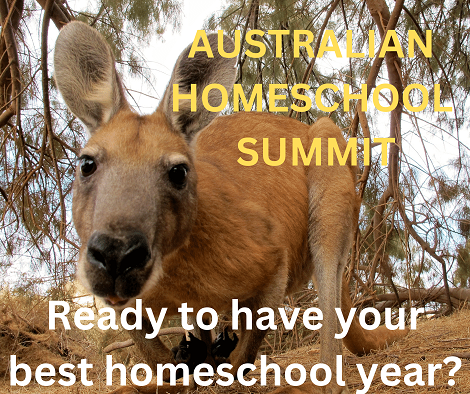|
Help! My kids are fighting...
by Beverley Paine, July 1999
When children come home after attending school for some years there is a period of adjustment that sometimes almost breaks the back of homeschooling desire! A friend recently complained that her two boys were constantly fighting, arguing with each other and competing against each other for her time. This was driving her crazy and she couldn't see her way clear to continuing educating them at home unless things drastically improved. Her boys had been home for five months.
Five months is not long - remember the eldest has been at school a long time - it will take a considerable period of time to fall into more natural, cooperative social behaviours. Patience is important, as well as having realistic expectations based on the developmental stages and individual personalities and temperaments of the children.
The process can be hastened along.
Self esteem building is critical in rehabilitating children who show aggressive behaviours. They must feel good about themselves before they can overcome competitiveness and the need to exert power over others. Perhaps everyone on the list could list some of the things they do with their children to build self esteem - suggestions of practical activities would be best.
I had a teacher friend whose class was less structured than others and she said it took at least a year for a student from an ordinary school background to settle in and find his or her place in the more democratically run class (where children had to take more responsibility for their learning). So don't despair - this period you are witnessing is 'normal', 'expected', and more importantly won't last indefinitely. (Unless you handle it badly, picking 'favourites', set up further competition, become overly heavy handed with 'discipline' and erode their self confidence, that is!)
I always found that when my kids fell into this kind of behaviour it usually meant they weren't getting enough quality time from me or dad. Quality time is defined as doing things together - and some of these things must be derived from what the child wants to do, on his or her terms, not forced or coerced activity by the parent.
Lots of one on one time with each individual child is essential. On good days, this might be a ten minute private chat on any subject - active listening and respectful conversation is crucial. On bad days you may need to put aside considerable time - eg, set the others up with an activity, a video, tv show, while you go somewhere quiet and play and chat with the kid. This isn't time out - it is time together. In schools they have a Learning Assisted Program person to do this for kids. I reckon it is a good idea in principle.
Lots of time with them all in activities is also necessary - where you guide development of appropriate cooperative behaviours. In games with rules where we had an age and ability range from 4 - 10 years - quite a difference - we agreed on what rules would apply, rather than just accepting the ones the game set out. This was before the game even started.
In preschools the staff go to considerable lengths to make sure there is enough to go round, and suitable substitutes for popular items. I did this at home - making sure there were always more than enough art and craft materials, resources, etc. If one child is riding a bike and the others want to ride too, then we make sure they are enough wheeled things to satisfy all - these don't always have to be the same. Turns are a great way to share - we used a kitchen timer a lot and had reasonable lengths of times based on the youngest's ability to wait - this increased as he grew. For some activities, like trampolining it was only five minutes, the computer went for half and hour.
The parent was concerned that her children's fighting and generally anti-social behaviour towards each other would overflow into some of the homeschooling activities that they did with other families, and that her family would no longer be welcome.
It's important for our children to know how we feel and to talk through our fears openly and honestly with them. A lot of problems and miscommunication can arise when we assume others understand what is bugging us. Our insecurities and fears may lead to irritable or less tolerant behaviour and we might end up jumping on and interrupting activities that might have otherwise resolved themselves without our 'help'.
It's also important to make it clear that we are uncomfortable and unhappy about anti-social and aggressive behaviour no matter where we are, and that we find it very stressful to manage and cope with when we are out and about. If going to an activity is a strain because of their behaviour and they don't seem to benefitting from the purpose of the activity, why go at all? Let them know how you feel.
I would not go to something my boys enjoy - like ice skating - if I found their behaviour unacceptable. I would also talk about my feelings of embarrassment, my concern for other children's safety and feelings, before hand. I would be lenient and go if they promised to be 'good' - but withdraw them immediately they relapsed. A firm and consistency and implemented when necessary policy is best.
It may help to draw up behaviour prinicples and post them on the fridge so everyone can be reminded. These rules need to be discussed and decided by the whole family - at a family 'meeting' where there are no distractions. IF the parents abide by the rules too then they will work much better. I have seen families do this often. One set of rules on a friend's fridge related to courtesy - picking up after oneself, saying thankyou and please, etc.
I really think we need to be very clear about our needs and expectations: stating them on paper and posted lets everyone know... no ambiguities to fight over!
We also need to remind ourselves that children 'test boundaries' all the time - it is called growing up and it really is quite okay - but it might occur more frequently during times of change. How we handle these espisodes is the key. I usually stuff up the first few 'testing' occasions and handle them badly, then see that the new behaviour is not going to last - I am being 'tested' and the child is trying on something. We don't always buy what we try on, and neither do children. So I come in then with some discussion about what is going on - I comment on what I see happening - what I see is good about it all - eg "You are finding your feet with this new situation and feel like you have more freedom to chose your activities and toys, etc, but perhaps you are feeling unsure about your level of responsibility. This conflict is spilling over into your relationship with your brother and causing you to be nasty to him. But really, are you just unsure about yourself? Is homeschooling worrying you at all?" Kids generally only move conflict around when they are in conflict with themselves somewhere.
Just like us adults, really.
The temptation to come down hard on the behaviour and resort to traditional methods of disciplining children can be great. It seems to work in the short term, I'm not sure about the long term effect though and consider myself as someone personally still recovering from the effects of this parenting approach.
In my early parenting years I took advice from a wise source. I learned to recognise behaviours on the old traffic light model - red behaviours are dangerous to self and others and need to be STOPPED immediately, orange are those may lead to hurt (feelings and physical) and caution is needed - eg the child can be cautioned, and the situation discussed to avoid red behaviour. Green is obvious - leave well alone, the child is happy and can continue. I don't interfere directly unless the behaviour is red. I stand back and watch when orange, or put in a word or two to guide to more appropriate behaviour with out taking over or being overly controlling, still leaving responsibility with the child.
The parent asked if it was " normal for kids new to homeschool to be constantly fighting, arguing,teasing, etc at home?"
Spend a few moments in any classroom when the teacher has stepped outside for a few minutes. Or stand in a corner of the playground where there is no supervision? Our home educating children, when withdrawn from school, have learned to be like this by their constant over stimulation and over socialisation within the classroom. It takes time to adjust to completely different learning environment.
This over stimulation may also be causing some boredom, because we are not constantly keeping them under control. Children who can't find anything posititive to do will engage in destructive behaviours. School children have been conditioned into believing that an adult is responsible for finding them something constructive to do.
We have to guide our children and help them learn to take this responsbility on themselves. It is best if we talk to them about this process and make it clear they will need to help. We aren't teachers - we don't need to act like teachers, we need to act like parents.
Joining a support group such as The Educating Parents Homeschooling and Unschooling or Homeschool Australia FAQ is a wonderful antidote to our fears and concerns in the early years of home educating.
See also Get Rid of the Cranky of Bored Kids!

Was this article helpful? Was it worth $1.00 to you?
Your gift of $1 or more helps to keep this site operating
offering encouragement
and reassurance to families
wanting
better outcomes for their children.



Beverley Paine with her children, and their home educated children, relaxing at home.
Together with the support of my family, my aim is to help parents educate their children in stress-free, nurturing environments. In addition to building and maintaing this website, I continue to create and manage local and national home educating networks, help to organise conferences and camps, as well as write for, edit and produce newsletters, resource directories and magazines. I am an active supporter of national, state, regional and local home education groups.
"You've been an inspiration to me, I love the way
you really listen to people." Vanessa
"Whenever I read your writing I always come away
with increased confidence in my ability to provide and
share a wonderful learning journey with my family!" Davina
"Your guidance, understanding, support and words of
wisdom changed our lives. We now offer support and
organise many homeschooling events for others." Lesley
"Thank you once again for your prompt and friendly service.
I am convinced that your books are going to add
quality and peace of mind to my journey of teaching my kids
at home! Just from studying your website, until almost
2am
in the morning, I 've been encouraged!" Louisa
"Thank you for all your many,many reassuring words
over many, many years. You probably don't know exactly how
valuable you are to the Australian Home Education community.
I've been reading your stuff for maybe 8 years or more now.
And I'm very grateful." Gythaa


CLICK HERE
if you want to learn
how to write your own education plans
to suit
your unique children's
individual learning needs?
Or you are looking for quality curriculum and teaching tips...
|
|
Welcome to the World of Home Education
and Learning without School!
We began educating our children in 1985, when our eldest was five. In truth, we had helped them learn what they need to learn since they were born. I am a passionate advocate of allowing children to learn unhindered by unnecessary stress and competition, meeting developmental needs in ways that suit their individual learning styles and preferences. Ours was a homeschooling, unschooling and natural learning family! There are hundreds of articles on this site to help you build confidence as a home educating family. We hope that your home educating adventure is as satisfying as ours was! Beverley Paine
3 ESSENTIAL STEP BY STEP GUIDES
Let experienced home educators Beverley, Tamara and April walk you through HOW to create a learning plan that builds on solid foundations that works for YOUR family AND ticks all the boxes for home educaton registration!
|

Tap into Beverley's
experience
through her books
"Your books, your blogs helped me beyond words... they helped me to find comfort in knowing it is ok to choose exactly what is best for my family." Nisha
"Your books and information are mind blowing and already I am feeling good about this new experience." Diane
"Your guidance, understanding, support & words of wisdom changed our lives." Leslie
"I feel specially inspired by Beverley's words and, the more I read her comments, the more inspired I feel, since my need for support, respect for different parenting styles, and information are fully met." Marijo
|
 |
|

The information on this website is of a general nature only and is not intended as personal or professional advice. This site merges and incorporates 'Homeschool Australia' and 'Unschool Australia'.
The Educating Parent acknowledges the Traditional Aboriginal and Torres Strait Islander Owners, the Custodians of Australia, and pay our respects to Elders past and present and extend that respect to Aboriginal and Torres Strait Islander people viewing this website.

Advertise on this site.













Australia's premier online annual conferences, lifetime access to video and audio recordings, freebies, notes and associated resource guides.
EVERY SUMMIT IS UNIQUE!
$29 each  2023 2023   2022 2022   2021 2021
$25 each  2020 2020  2019 2019   2017 2017
"Biggest and best Aussie homeschool event of the year!"

Home education is a legal alternative
to school education in Australia.
State and Territory governments are responsible
for regulating home education and have different
requirements, however home educating families
are able to develop curriculum and learning programs
to suit the individual needs of their children.

Without revenue from advertising
by educational suppliers and Google Ads
we could not continue to provide information
to home educators. Please support us by letting
our advertisers know that you found them on
The Educating Parent. Thanks!
|
![]() About
About
![]() Blog
Blog
![]() Articles
Articles
![]() Curriculum
Curriculum
![]() Resource Directory
Resource Directory
![]() Shop
Shop
![]() Kids Pages
Kids Pages
![]() Facebook
Facebook

![]() SA
SA ![]() VIC
VIC ![]() NSW
NSW ![]() QLD
QLD ![]() TAS
TAS ![]() ACT
ACT ![]() NT
NT ![]() NSW
NSW ![]() QLD
QLD ![]() SA
SA ![]() WA
WA ![]() TAS
TAS ![]() ACT
ACT ![]() NT
NT 





















